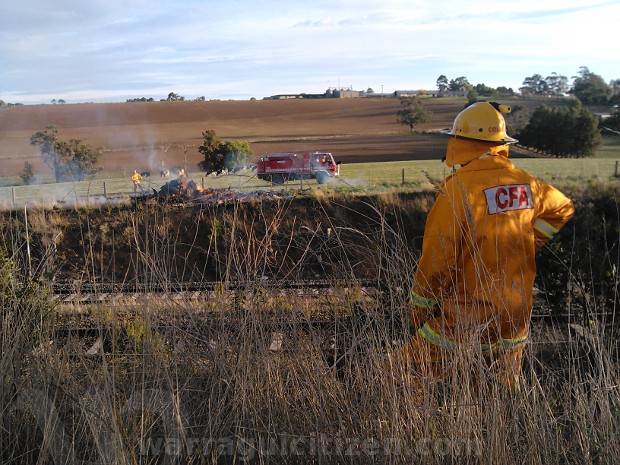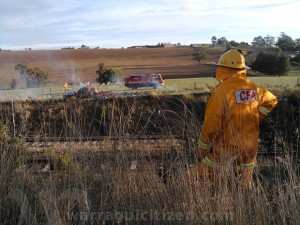

CLIMATE // A STUDY of bushfire responses over the last century has concluded Victorians must change their behaviour, and even where they live, to survive increasingly hot summers.
First published in the 11 December 2015 print edition of the Warragul & Baw Baw Citizen. All dates relative to then.
University of Melbourne doctoral researcher Graham Dwyer recently published his findings from three years of research, concluding we have not taken enough of the right actions to deal with a warming climate and finger pointing has been a distraction.
Mr Dwyer noted much of the response to major bushfire events was focussed around royal commissions.
“Unfortunately, the last bushfire royal commission — after the 2009 Black Saturday fires — resulted in finger pointing, blame, vilification and scapegoating,” he said.
“We have already seen these characteristics at the start of this year’s fire season, which only keeps us looking backwards when we need to look forward.
“We now know enough about bushfire behaviour and how our community and emergency services react that the money, time, energy and political attention devoted to Royal Commissions would be better spent planning for the future.
“This is a key finding from my three years of doctoral research.”
Mr Dwyer’s research included interviews with 63 Victorian emergency services experts and an analysis of public inquiry reports, recommendations and comments from politicians and experts since Victoria’s first bushfire commission in 1939.
“Victoria is arguably the world’s most bushfire-prone area. We accept that fire has been part of our landscape for as long as records have been kept,” he said.
“We would also accept the many studies which predict climate change mean more frequent, complex and devastating bushfires.
“Inevitably, we will see another Black Friday, Ash Wednesday and Black Saturday. These fire events can no longer be considered as once-in-a-generation events.”
One of Mr Dwyer’s most significant recommendations was that Victorians change the way they view the land and where they live, saying we have a “false sense of security” in believing bushfires can be prevented.
“Our historical sense of entitlement to own and develop land in fire-prone areas, and all of our technology today, has made that view more prevalent even in the face of ever-increasing bushfire risk,” he said.
“If we paid attention to what we have already learned, and woke up to the ecological reality of where we are living… we could make Victoria a much safer place during the bushfire season.
“Seventy-six years of learning has led to innovations. We have seen improvements in community bushfire education programs, advances in modelling fire behaviour, more sophisticated approaches to delivering bushfire warnings, an increased emphasis on planned burning to prepare for fire seasons, and greater integration across emergency management agencies.
“But each fire is unique and we run the risk of becoming complacent if we think previous public inquiries have delivered us to a position of safety.
“Unfortunately, bushfire-prone communities continue to ignore the findings of bushfire royal commissions.
“We can’t keep building out into high bushfire risk areas.”
Mr Dwyer’s report does not suggest anything not previously proposed as a way of dealing with the risks, rather his emphasis is on learning from the studies and reports already available.
“The best form of protection is knowledge and acceptance of facts, even when those facts are challenging to how we usually think about land use, ownership and development,” he said.
“The other key is the behaviour of those who are living and working in high-risk areas. People in these areas should have a fire plan ready long before the bushfire season. They should know what they’re going to do on a day of high fire danger. They should make decisions which minimise their risk.
“The community can do so much to protect themselves and each other. There has been much sensitivity about talking about communities and their role in the future — more attention has been focused instead on emergency services and the past.
“The most dangerous thing is to not have the debate about who is accountable and responsible because, ultimately, we all are.”

More like this:
After all the fuss – or lack thereof – over the last few days, Radiohead finally dropped Burn The Witch an hour ago.
It seems Radiohead forgot about Google+ when deleting everything it has ever posted on the internet – the band’s one upload remains!
THE FAT cat has long been a derisive representation the über-wealthy and greedy, and a new exhibition will put that food-shovelling image front and centre.
A drunken (allegedly) evening after a fan convention led to the conception of this year’s “copied” comic April Fools’ Day prank, which saw seemingly every webcomic artist create the exact same cartoon and then claim ownership.
It is difficult for a cartoonist to make an April Fools’ Day joke stand out; almost every strip releases at least one, and isn’t making fools of people what most comics do every day? This year however, something truly special has happened.
THERE is a light at the end of the tunnel for frustrated V/Line commuters with confirmation a further 43 rail services will be restored later this month.